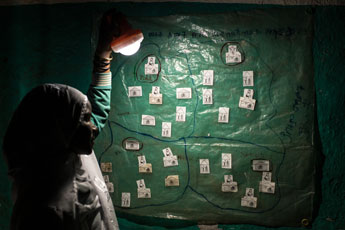Community-Based Data for Decision Making (CBDDM) Strategy

Community-Based Data for Decision Making (CBDDM) is a simple surveillance mechanism—a community map—that helps gather and visualize data on household RMNCH practices. Women's Development Army (WDA) leaders use these maps to follow up with households and regularly update them to reflect changes within households. The maps help WDA members and HEWs identify pregnant women and newborns to ensure they receive the appropriate health services throughout their lives. Using data from the maps, HEWs can measure progress and identify gaps in health care practices in their kebeles, which in turn helps district and sub-district governments make decisions to improve health care services. The CBDDM tools are now part of the Federal Ministry of Health's Integrated Refresher Training package for HEWs and Level-I WDA competency-based training manuals.
L10K implemented Community-Based Data for Decision-Making (CBDDM) in 115 rural districts to improve the demand for and use of maternal and newborn health services. Using the CBDDM strategy, HEWs strengthened the skills of the WDA and community leaders to inform, lead, own, plan, and monitor maternal and newborn health interventions in their kebeles (communities), which improved household practices and use of key RMNCH services. A cross-sectional survey conducted in 2010-2011 and 2014-2015 showed kebeles that increased CBDDM implementation saw greater improvements in the coverage of neonatal tetanus-protected childbirths, institutional deliveries, clean cord care for newborns, thermal care for newborns, and immediate initiation of breastfeeding. Read more in L10K's article published in BMC Pregnancy and Childbirth, Effects of a community-based data for decision-making intervention on maternal and newborn health care practices in Ethiopia: a dose-response study.
